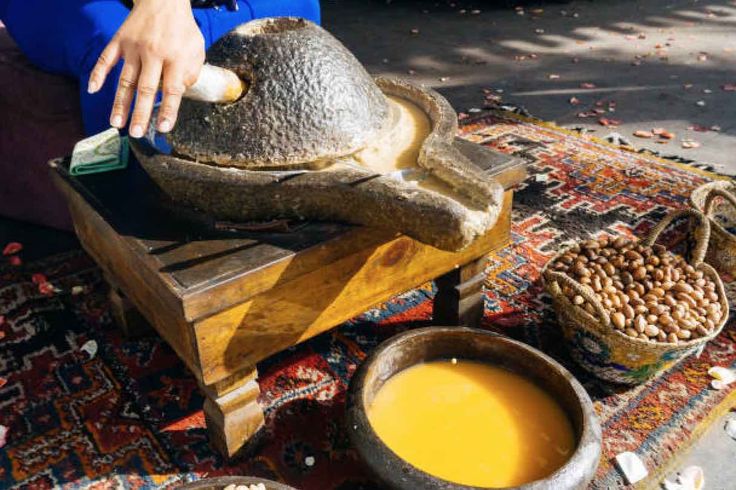No products in the cart.
Argan Oil Recipe: Morocco’s Berber Treasure – Benefits and Culinary Uses
ⴰⵔⴳⴰⵏ ⵓⵥⴰⵍ ⵉⵏⴰⵎⵉ: ⵍⵎⵓⵖⵔⵉ ⵏ ⵓⵏⵏⵓ ⴰⵎⴰⵣⵉⵖ – ⴱⴻⵏⴼⵉⵜ ⴷ ⵓⵣⴰⵍ ⵏ ⵜⵉⴼⵉⵏⴰⵖ ⵉⵏⴰⵏⵉ
Argan oil, often called “liquid gold,” originates from the ancient argan trees of southwestern Morocco. For centuries, the Berber people, also known as the Amazigh, have harvested this precious oil for both cosmetic and culinary purposes. While argan oil is famed for its beauty benefits, its culinary counterpart is a hidden gem with a rich, nutty flavor and numerous health benefits.
How Is Culinary Argan Oil Made?
The process begins with the argan tree’s fruit, which is dried in the sun. The nuts inside are then cracked open by hand to extract the seeds, a labor-intensive process often performed by local women. The seeds are roasted (giving the oil its distinctive flavor) and cold-pressed to produce culinary argan oil.

ⴰⵎⴽⴰⵏ ⵉ ⴷ ⴼⵓⵙ ⴷ ⵙⴻⴷⴷⵓⴽ, ⴰⴷ ⵉⴳ ⵉⵍⵍⴰⵏ ⵜⴰⴼⵓⴽⵜ.
Traditional Berber Argan Recipes
1. Amlou – The Berber Superfood
Ingredients:
- 1 cup roasted almonds
- 1/2 cup argan oil
- 1/4 cup honey
Instructions:
- Blend the roasted almonds into a fine paste.
- Slowly mix in the argan oil and honey until the mixture achieves a creamy consistency.
- Serve with bread or as a dip for a wholesome breakfast.
Amlou is packed with healthy fats, protein, and antioxidants, making it a nutritious and energy-boosting spread.
2. Argan Oil Salad Dressing
Ingredients:
- 3 tablespoons argan oil
- 2 tablespoons lemon juice
- 1 tablespoon honey
- A pinch of salt and pepper
Instructions:
Whisk all the ingredients together and drizzle over salads. The nutty richness of argan oil complements fresh greens, grains, and roasted vegetables beautifully.

Health Benefits of Culinary Argan Oil
- Rich in Nutrients:
Argan oil is high in vitamin E, an antioxidant that supports skin health and protects cells from damage. - Heart-Healthy Fats:
It contains unsaturated fats, including omega-3 and omega-9, which promote cardiovascular health by reducing bad cholesterol and improving good cholesterol levels. - Anti-Inflammatory Properties:
The oil’s natural compounds help reduce inflammation, benefiting conditions such as arthritis and metabolic disorders. - Improved Digestion:
Traditionally, Berbers have used argan oil to aid digestion and improve gut health, thanks to its natural compounds that increase pepsin levels in the stomach.


How to Incorporate Culinary Argan Oil in Your Diet
- Drizzle over soups: A spoonful of argan oil adds a luxurious, nutty finish to Moroccan lentil or pumpkin soup.
- Use in desserts: Its distinct flavor pairs wonderfully with cakes, cookies, and pastries.
- Marinate meats: Mix argan oil with herbs and spices for a flavorful marinade for chicken, lamb, or fish.
- Dip for bread: Serve it plain with freshly baked bread for a simple yet satisfying appetizer.
Preserving and Storing Argan Oil
Culinary argan oil should be stored in a cool, dark place to maintain its freshness and prevent it from turning rancid. Always choose high-quality, cold-pressed oil for maximum benefits and flavor.
Culinary argan oil is not just a food ingredient; it’s a reflection of Morocco’s rich cultural heritage and the Berber people’s resourcefulness. Whether you’re savoring it as part of traditional recipes like amlou or experimenting with it in modern dishes, argan oil brings a touch of Morocco’s magic to your kitchen.




Leave a Reply